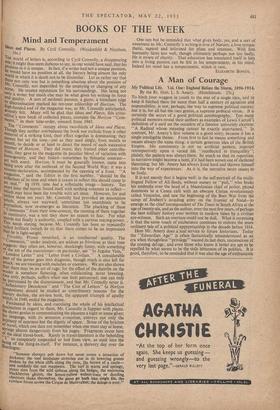BOOKS OF THE WEEK
Mind and Temperament
THE world of letters is, according to Cyril Connolly, a disappearing nne; it might thus seem dubious to say, as one would have said, that his Position in it is unique. In fact, if a writer had not a unique position, he would have no position at all, the literary being almost the only World in which it is death not to be dissimilar. Let us rather say that there not only was but is something absolute about the position of Mr. r. Connolly, not imperilled by the emptying or changing of any scene. He creates reputation for his surroundings. His being not mu)! a writer but much else may be what gives his writing its force and quality. A sort of sardonic passion, a gusto, a trenchant edge 1,o. discrimination marked his ten-year editorship of Horizon. The high-handed end of the magazine was, as Mr. Connolly anticipated, severely felt. Many will be glad that Ideas and Places, this critic- editor's new book of collected pieces, contains the Horizon "Com- ments," in their time-order, onward from 1945. The "Comments" occupy about two-thirds of Ideas and Places. hough they neither overbalance the book nor exclude from it other Material of a striking kind, their effect together is dominating; they cannot but set the tone—just as they used singly, from month to month, to decide or at least to direct the mood of each successive number of Horizon. They did more; they framed other contribu- tions, they gave to the magazine its peculiar blend of variation with homogeneity, and they linked—sometimes by fantastic contrast— art with event. Horizon, it must be generally known, came into being soon after the outbreak of the Second World War: it was a counter-declaration, accompanied by the opening of a front. "A Magazine," said the Editor in the first number, "should be the reflection of its time and when it ceases to reflect this should come to an end." hi 1939, time had a reflectable image — history. Ten Years later the, mirror found itself with nothing coherent to reflect— which may have been the trouble with art since. However, for and Within those ten years Mr. Connolly had provided an annotation Which, always too wayward, sometimes too anarchistic to be •!ournalism, now re-emerges as literature. The plucking of these Comments" from their time-context, the running of them together An continuity, was a test they show no reason to fear. For what 'stands out finally is authority, coupled with a curious staying-power. This needs stating, because. Mr. Connolly has been so repeatedly called brilliant (which he is) that there comes to be an impression that he is light-weight. Frivolity, Proust remarked, is an intellectual quality. The "Comments," under analysis, are seldom as frivolous as their tone suggests: they often are, however, shockingly funny, with something 0, f the wit of the executioner—in particular, see "In Jugular Vein," London Letter" and "Letter from a Civilian." A considerable Part of the power goes into diagnosis, though much is also left for attack: we are treating with maladies or enemies. We are also shown .that there may be an art of rage; for the effect of the diatribe on the reader is somehow flattering, often exhilarating, never lowering. one only, perhaps, suffers when one feels patronised; one can only F, Patronised by the dispassionate, and that Mr. Connolly never is. Inflationary Decadence" and "The Cost of Letters" (a Horizon symposium) should be studied as contributory reasons for the literary decline, the art-less hush, the apparent triumph of apathy Which, in 1949, ended the magazine. Fascinated by ideas, and exercising the whole of his intellectual fascination in regard to them, Mr. Connolly is happier with places. L.-1e shows genius in communicating the pleasure a sight or scene giVes; I5 language, with its sensuous evocation, conveys not only the Intimacy of nearness but the dignity of space.. Sense of the lyricism of travel, which one dare not remember when one must stay at home, springs almost dangerously from his pages. Fragments occur here of the ideal travel-book. Rarely in travel-literature is the beholding Da`r so completely suspended or lost from view, so sunk into the g of the thing-in-itself. For instance, a showery day over the dogne: "Summer showprs pelt down but never create a sensation of darkness: the vasf landscape stretches out in its lowering greens broken by the white cliffs along the river, the brown of a castle— and suddenly the sun reappears. The turf is warm and springy, steam rises from the wild quinces along the hedges, the enormous blackberries glisten, the lemon-yellow walnut-trees or dazzling chestnuts shake themselves, the geese go back into single file, the rainbow forms across the Cirque de Montvalent; the deluge is over."
One can but be reminded that what gives body, yes, and a sort of sweetness to Mr. Connolly's writing is love of Nature; a love sympai thetic, sapient and informed for plant and creature. With him humanity fares less well, though ultimately perhaps not too badly. He is aware of charity. That education has translated itself in him into a living passion can be felt in his temperament, in his mind. Indeed his mind has a temperament, which is rare.
ELIZABETH BOWEN.


































 Previous page
Previous page